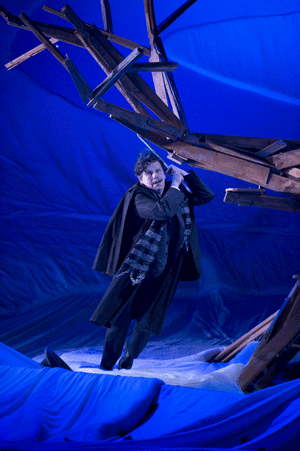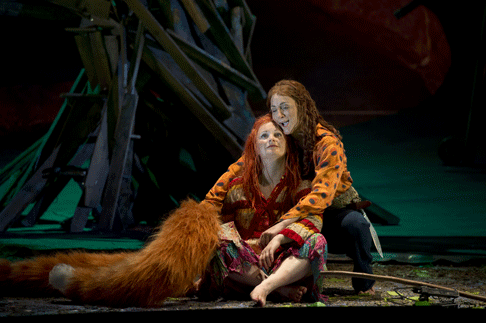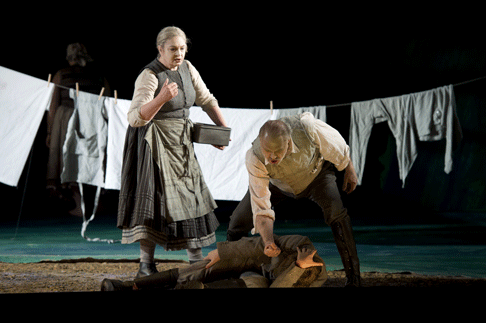![Lucy Crowe as Vixen Sharp Ears. [Photo by Bill Cooper courtesy of Glyndebourne Festival 2012]](http://www.operatoday.com/vixen11_bill_cooper.gif)
30 May 2012
Glyndebourne Janáček The Cunning Little Vixen
Glyndebourne’s 2012 season started in great style with Leoš Janáček’s The Cunning Little Vixen. Its rapturous reception would suggest that this could become a Glyndebourne perennial.
English Touring Opera are delighted to announce a season of lyric monodramas to tour nationally from October to December. The season features music for solo singer and piano by Argento, Britten, Tippett and Shostakovich with a bold and inventive approach to making opera during social distancing.
This tenth of ten Live from London concerts was in fact a recorded live performance from California. It was no less enjoyable for that, and it was also uplifting to learn that this wasn’t in fact the ‘last’ LfL event that we will be able to enjoy, courtesy of VOCES8 and their fellow vocal ensembles (more below …).
Ever since Wigmore Hall announced their superb series of autumn concerts, all streamed live and available free of charge, I’d been looking forward to this song recital by Ian Bostridge and Imogen Cooper.
The Sixteen continues its exploration of Henry Purcell’s Welcome Songs for Charles II. As with Robert King’s pioneering Purcell series begun over thirty years ago for Hyperion, Harry Christophers is recording two Welcome Songs per disc.
Although Stile Antico’s programme article for their Live from London recital introduced their selection from the many treasures of the English Renaissance in the context of the theological debates and upheavals of the Tudor and Elizabethan years, their performance was more evocative of private chamber music than of public liturgy.
In February this year, Albanian soprano Ermonela Jaho made a highly lauded debut recital at Wigmore Hall - a concert which both celebrated Opera Rara’s 50th anniversary and honoured the career of the Italian soprano Rosina Storchio (1872-1945), the star of verismo who created the title roles in Leoncavallo’s La bohème and Zazà, Mascagni’s Lodoletta and Puccini’s Madama Butterfly.
Evidently, face masks don’t stifle appreciative “Bravo!”s. And, reducing audience numbers doesn’t lower the volume of such acclamations. For, the audience at Wigmore Hall gave soprano Elizabeth Llewellyn and pianist Simon Lepper a greatly deserved warm reception and hearty response following this lunchtime recital of late-Romantic song.
Collapsology. Or, perhaps we should use the French word ‘Collapsologie’ because this is a transdisciplinary idea pretty much advocated by a series of French theorists - and apparently, mostly French theorists. It in essence focuses on the imminent collapse of modern society and all its layers - a series of escalating crises on a global scale: environmental, economic, geopolitical, governmental; the list is extensive.
For this week’s Live from London vocal recital we moved from the home of VOCES8, St Anne and St Agnes in the City of London, to Kings Place, where The Sixteen - who have been associate artists at the venue for some time - presented a programme of music and words bound together by the theme of ‘reflection’.
'Such is your divine Disposation that both you excellently understand, and royally entertaine the Exercise of Musicke.’
Amongst an avalanche of new Mahler recordings appearing at the moment (Das Lied von der Erde seems to be the most favoured, with three) this 1991 Mahler Second from the 2nd Kassel MahlerFest is one of the more interesting releases.
‘And there was war in heaven: Michael and his angels fought against the dragon; and the dragon fought and his angels, And prevailed not; neither was their place found any more in heaven … that old serpent … Satan, which deceiveth the whole world: he was cast out into the earth, and his angels were cast out with him.’
If there is one myth, it seems believed by some people today, that probably needs shattering it is that post-war recordings or performances of Wagner operas were always of exceptional quality. This 1949 Hamburg Tristan und Isolde is one of those recordings - though quite who is to blame for its many problems takes quite some unearthing.
There was never any doubt that the fifth of the twelve Met Stars Live in Concert broadcasts was going to be a palpably intense and vivid event, as well as a musically stunning and theatrically enervating experience.
‘Love’ was the theme for this Live from London performance by Apollo5. Given the complexity and diversity of that human emotion, and Apollo5’s reputation for versatility and diverse repertoire, ranging from Renaissance choral music to jazz, from contemporary classical works to popular song, it was no surprise that their programme spanned 500 years and several musical styles.
The Academy of St Martin in the Fields have titled their autumn series of eight concerts - which are taking place at 5pm and 7.30pm on two Saturdays each month at their home venue in Trafalgar Square, and being filmed for streaming the following Thursday - ‘re:connect’.
The London Symphony Orchestra opened their Autumn 2020 season with a homage to Oliver Knussen, who died at the age of 66 in July 2018. The programme traced a national musical lineage through the twentieth century, from Britten to Knussen, on to Mark-Anthony Turnage, and entwining the LSO and Rattle too.
With the Live from London digital vocal festival entering the second half of the series, the festival’s host, VOCES8, returned to their home at St Annes and St Agnes in the City of London to present a sequence of ‘Choral Dances’ - vocal music inspired by dance, embracing diverse genres from the Renaissance madrigal to swing jazz.
Just a few unison string wriggles from the opening of Mozart’s overture to Le nozze di Figaro are enough to make any opera-lover perch on the edge of their seat, in excited anticipation of the drama in music to come, so there could be no other curtain-raiser for this Gala Concert at the Royal Opera House, the latest instalment from ‘their House’ to ‘our houses’.
"Before the ending of the day, creator of all things, we pray that, with your accustomed mercy, you may watch over us."
![Lucy Crowe as Vixen Sharp Ears. [Photo by Bill Cooper courtesy of Glyndebourne Festival 2012]](http://www.operatoday.com/vixen11_bill_cooper.gif)
Glyndebourne’s 2012 season started in great style with Leoš Janáček’s The Cunning Little Vixen. Its rapturous reception would suggest that this could become a Glyndebourne perennial.
Inspired by a novella illustrated by cartoons, the story of Vixen Sharp Ears has great charm. The production glows with gorgeous colours, on stage and in the pit. Vladimir Jurowski conducts the London Philharmonic Orchestra with lustrous style: you can hear the “birds” in the score, feel the sunshine and thrill to the starlit night sky in the final scene.
 Adrian Thompson as The Schoolmaster
Adrian Thompson as The Schoolmaster
The Cunning Little Vixen is about nature, but it’s not naturalistic. Janáček observed nature closely, but doesn’t write about animals so much as about human nature. Thus the intense gemstone colours of Tom Pye’s designs dazzle gloriously. Like the World Ash Tree in Wagner’s Ring, a huge construction looms over the stage. It’s a tree which changes with the seasons : spring blossom, autumn golds, bare winter branches. Since one of the themes in this opera is the passing of time, the tree is a natural metaphor. There’s a slide behind it from which animals pop up and observe. Later, it’s shown as the lair in which the foxes live. This vividness reflects Jurowski’s approach to the music. Although Jurowski softens the sharper edges of Janáček’s idiom, he creates surges so lush that he brings out the vigorous life force that’s fundamental to the meaning of this opera. The Vixen dies, the Forester grows old, but nature renews itself each year, and the grandchildren of foxes and frogs continue the cycle of life.
“Kontrapunkte, Kontrapunkte”, the Forester (Sergei Leiferkus) tells the Schoolmaster (Adrian Thompson) He’s explaining that the dry old schoolmaster’s not right for a woman like Terinka. It’s a wry joke, not something a woodsman would say, but a composer might. Perhaps Janáček identified with the Schoolmaster, withering away without love. Significantly, he found new creative momentum in old age, when he met Camila Stösslová. Janáček is quite explicit about what makes the sap rise in human beings. “How many children do we have, dear?” asks the Fox of the Vixen. “We’ll make many more”.
 Lucy Crowe as Vixen Sharp Ears and Emma Bell as Fox
Lucy Crowe as Vixen Sharp Ears and Emma Bell as Fox
In this production, one of the finest scenes is the one where the Fox (Emma Bell) courts the Vixen (Lucy Crowe), just as a formal, old-fashioned formal couple might have done in Janáček’s youth. “May I call upon you?” he asks, and she responds coyly. Very decorous. Animals don’t beat around the bush like that. Janáček then becomes even more daring. “Do you smoke?” asks the Fox. Is the Vixen A Modern Woman, emacipated like Stösslová, and not domesticated like Zdenka, the composer’s wife? The Vixen lives independently (in a treehouse inherited from “Uncle Badger” (Mischa Schelomianski). “My ideal woman!” cries the Fox. There are cryptic personal meanings in The Cunning Little Vixen which can easily be missed. Please see my piece “Janáček, Cunning Vixen and Subversion”. The scene isn’t heavily scored, so the words carry weight and Jurowski lets them be heard clearly, Then, when the mood shifts, orchestral textures become more dense, even sinister. Listen for the triumphant finale, which could be sheer Hollywood (though it was written long before film had sound). As life ebbs from the Forester’s body, his spirit breaks free. You can imagine Janáček joyfully defying convention. The Forester doesn’t die with “The Old Woman”, his wife (Jean Rigby) but with the spirit of the Vixen and her wild ways.
Sergei Leiferkus’s Forester is outstanding, created with real vigour. He’s of course an extremely experienced singer, but he’s also a strong actor with a wonderful sense of humour. He does Shostakovich satires with panache. In 2010, he sang Edward German’s Who were the Yeomen of England at the reconstruction of a 1910 Prom. He sang with a heavy accent, but with such glee that it felt more sincere than any dour, irony-free performance. Adrian Thomnpson, as the Schoolmaster/Mosquito, was sadly underused. He can sing Czech better than most Englishmen, and has done a lot of Janáček. He deserves a higher profile. Lucy Crowe as The Vixen was clear. pert and spirited, as a good Vixen should be.
This Glyndebourne Cunning Little Vixen is great entertainment, and orchestrally rewarding. It’s let down, however, by direction that’s less incisive. While Janáček defines the roles vividly, Melly Still turns characters into caricatures. Dressing humans as animals is almost as tricky as dressing animals as humans. From time to time, the cast move like animals, but that’s not enough. The focus should be on who the animals really represent. Partly the problem lies in the costumes (Dinah Collin) which make it hard to realise who’s who unless you’ve read the synopsis.
 Sergei Leiferkus as The Forester and Jean Rigby as his wife
Sergei Leiferkus as The Forester and Jean Rigby as his wife
But the bigger problem is that the parts are given no personality. The weakest scene in this production occurs in the hen coop where the Vixen tries to get the chickens to rebel against male dominance. It can be literally “red of claw and tooth” because the Vixen tears the Cock apart. Here, though, it’s so tame you could miss it among the busy babble going round the stage. The dancers are nice, but they don’t add much. Yet the Cock, Hens and The Dog are all crucial to the deeper meaning of this opera. Even the Vixen isn’t well developed. When the Vixen discovers the mystery of sex, poor Lucy Crowe pushes up her blouse in an unsubtle attempt to look “sexy”. Yet what Janáček has been telling us all along is that nature is instinct, not appearance, and that instincts win. When these darker, more radical aspects of the opera aren’t defined, The Cunning Little Vixen loses its bite. And what is a Vixen without fangs?
This production will be broadcast online on 10th June. On film, it might be a better experience. A film director could focus on essentials, and give the characters more definition than the stage director.
For more details, please visit the Glyndebourne website.
Anne Ozorio